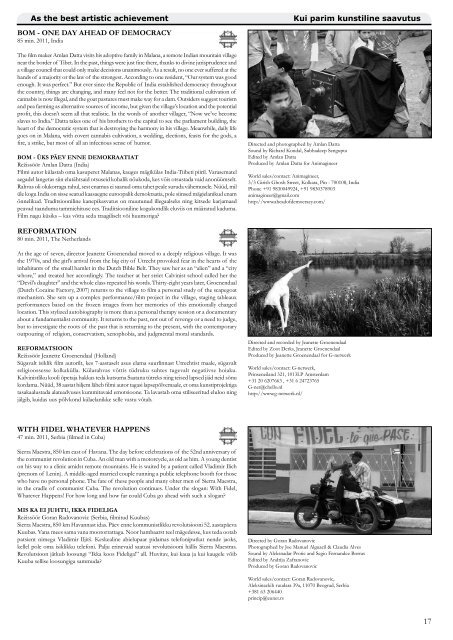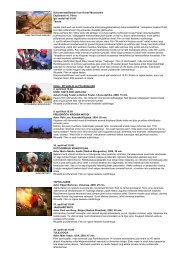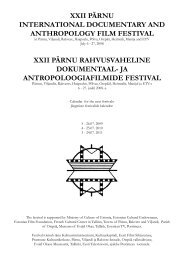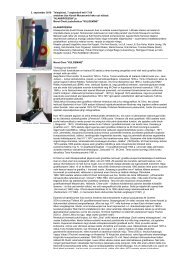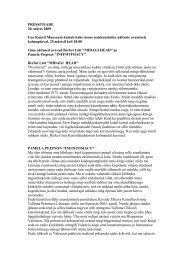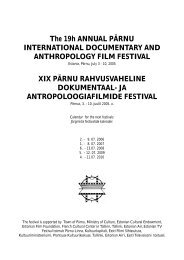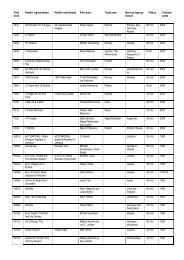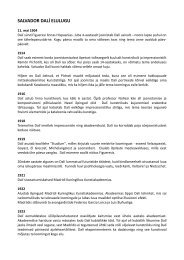xxvi pärnu international documentary and anthropology film festival ...
xxvi pärnu international documentary and anthropology film festival ...
xxvi pärnu international documentary and anthropology film festival ...
Create successful ePaper yourself
Turn your PDF publications into a flip-book with our unique Google optimized e-Paper software.
As the best artistic achievement<br />
BOM - ONE DAY AHEAD OF DEMOCRACY<br />
85 min. 2011, India<br />
The <strong>film</strong> maker Amlan Datta visits his adoptive family in Malana, a remote Indian mountain village<br />
near the border of Tibet. In the past, things were just fine there, thanks to divine jurisprudence <strong>and</strong><br />
a village council that could only make decisions unanimously. As a result, no one ever suffered at the<br />
h<strong>and</strong>s of a majority or the law of the strongest. According to one resident, “Our system was good<br />
enough. It was perfect.” But ever since the Republic of India established democracy throughout<br />
the country, things are changing, <strong>and</strong> many feel not for the better. The traditional cultivation of<br />
cannabis is now illegal, <strong>and</strong> the goat pastures must make way for a dam. Outsiders suggest tourism<br />
<strong>and</strong> pea farming as alternative sources of income, but given the village’s location <strong>and</strong> the potential<br />
profit, this doesn’t seem all that realistic. In the words of another villager, “Now we’ve become<br />
slaves to India.” Datta takes one of his brothers to the capital to see the parliament building, the<br />
heart of the democratic system that is destroying the harmony in his village. Meanwhile, daily life<br />
goes on in Malana, with covert cannabis cultivation, a wedding, elections, feasts for the gods, a<br />
fire, a strike, but most of all an infectious sense of humor.<br />
BOM - ÜKS PÄEV ENNE DEMOKRAATIAT<br />
Režissöör Amlan Datta (India)<br />
Filmi autor külastab oma kasuperet Malanas, kauges mägikülas India-Tiibeti piiril. Varasematel<br />
aegadel langetas siin elutähtsaid otsuseid kohalik nõukoda, kes võis otsustada vaid anonüümselt.<br />
Rahvas oli olukorraga rahul, sest enamus ei saanud oma tahet peale suruda vähemusele. Nüüd, mil<br />
üle kogu India on sisse seatud kaasaegne euroopalik demokraatia, pole siinsed mägielanikud enam<br />
õnnelikud. Traditsiooniline kanepikasvatus on muutunud illegaalseks ning kitsede karjamaad<br />
peavad ta<strong>and</strong>uma tammiehituse ees. Traditsiooniline kogukondlik eluviis on määratud kaduma.<br />
Film nagu küsiks – kas võtta seda traagiliselt või huumoriga?<br />
REFORMATION<br />
80 min. 2011, The Netherl<strong>and</strong>s<br />
At the age of seven, director Jeanette Groenendaal moved to a deeply religious village. It was<br />
the 1970s, <strong>and</strong> the girl’s arrival from the big city of Utrecht provoked fear in the hearts of the<br />
inhabitants of the small hamlet in the Dutch Bible Belt. They saw her as an “alien” <strong>and</strong> a “city<br />
whore,” <strong>and</strong> treated her accordingly. The teacher at her strict Calvinist school called her the<br />
“Devil’s daughter” <strong>and</strong> the whole class repeated his words. Thirty-eight years later, Groenendaal<br />
(Dutch Cocaine Factory, 2007) returns to the village to <strong>film</strong> a personal study of the scapegoat<br />
mechanism. She sets up a complex performance/<strong>film</strong> project in the village, staging tableaux<br />
performances based on the frozen images from her memories of this emotionally charged<br />
location. This stylized autobiography is more than a personal therapy session or a <strong>documentary</strong><br />
about a fundamentalist community. It returns to the past, not out of revenge or a need to judge,<br />
but to investigate the roots of the past that is returning to the present, with the contemporary<br />
outpouring of religion, conservatism, xenophobia, <strong>and</strong> judgmental moral st<strong>and</strong>ards.<br />
REFORMATSIOON<br />
Režissöör Jeanette Groenendaal (Holl<strong>and</strong>)<br />
Sügavalt isiklik <strong>film</strong> autorilt, kes 7-aastaselt asus elama suurlinnast Utrechtist maale, sügavalt<br />
religioossesse kolkakülla. Külarahvas võttis tüdruku suhtes tugevalt negatiivse hoiaku.<br />
Kalvinistliku kooli õpetaja hakkas teda kutsuma Saatana tütreks ning teised lapsed jäid neid sõnu<br />
kordama. Nüüd, 38 aastat hiljem läheb <strong>film</strong>i autor tagasi lapsepõlvemaale, et oma kunstiprojektiga<br />
tasakaalustada alateadvuses kummitavaid emotsioone. Ta lavastab oma stiliseeritud eluloo ning<br />
jälgib, kuidas uus põlvkond külaelanikke selle vastu võtab.<br />
WITH FIDEL WHATEVER HAPPENS<br />
47 min. 2011, Serbia (<strong>film</strong>ed in Cuba)<br />
Sierra Maestra, 850 km east of Havana. The day before celebrations of the 52nd anniversary of<br />
the communist revolution in Cuba. An old man with a motorcycle, as old as him. A young dentist<br />
on his way to a clinic amidst remote mountains. He is waited by a patient called Vladimir Ilich<br />
(prenom of Lenin). A middle-aged married couple running a public telephone booth for those<br />
who have no personal phone. The fate of these people <strong>and</strong> many ohter men of Sierra Maestra,<br />
in the cradle of communist Cuba. The revolution continues. Under the slogan: With Fidel,<br />
Whatever Happens! For how long <strong>and</strong> how far could Cuba go ahead with such a slogan?<br />
MIS KA EI JUHTU, IKKA FIDELIGA<br />
Režissöör Goran Radovanovic (Serbia, <strong>film</strong>itud Kuubas)<br />
Sierra Maestra, 850 km Havannast idas. Päev enne kommunistlikku revolutsiooni 52. aastapäeva<br />
Kuubas. Vana mees sama vana mootorrattaga. Noor hambaarst teel mägedesse, kus teda ootab<br />
patsient nimega Vladimir Iljitš. Keskealine abielupaar pidamas telefoniputkat nende jaoks,<br />
kellel pole oma isiklikku telefoni. Palju erinevaid saatusi revolutsiooni hällis Sierra Maestras.<br />
Revolutsioon jätkub loosungi “Ikka koos Fideliga!” all. Huvitav, kui kaua ja kui kaugele võib<br />
Kuuba sellise loosungiga sammuda?<br />
Kui parim kunstiline saavutus<br />
Directed <strong>and</strong> photographed by Amlan Datta<br />
Sound by Richard Kondal, Subhadeep Sengupta<br />
Edited by Amlan Datta<br />
Produced by Amlan Datta for Animagineer<br />
World sales/contact: Animagineer,<br />
3/3 Girish Ghosh Street, Kolkata, Pin - 700108, India<br />
Phone +91 9830049924, +91 9830378903<br />
animagineer@gmail.com<br />
http://www.aheadofdemocracy.com/<br />
Directed <strong>and</strong> recorded by Jeanette Groenendaal<br />
Edited by Zoot Derks, Jeanette Groenendaal<br />
Produced by Jeanette Groenendaal for G-netwerk<br />
World sales/contact: G-netwerk,<br />
Prinseneil<strong>and</strong> 321, 1013LP Amsterdam<br />
+31 20 6207663 , +31 6 24723765<br />
G-net@chello.nl<br />
http://www.g-netwerk.nl/<br />
Directed by Goran Radovanovic<br />
Photographed by Joe Manuel Alguacil & Claudia Alves<br />
Sound by Aleksnadar Protic <strong>and</strong> Segio Fern<strong>and</strong>ez Borras<br />
Edited by Andrija Zafranovic<br />
Produced by Goran Radovanovic<br />
World sales/contact: Goran Radovanovic,<br />
Aleksinackih ruudara 39a, 11070 Beograd, Serbia<br />
+381 63 206440<br />
princip@eunet.rs<br />
17


